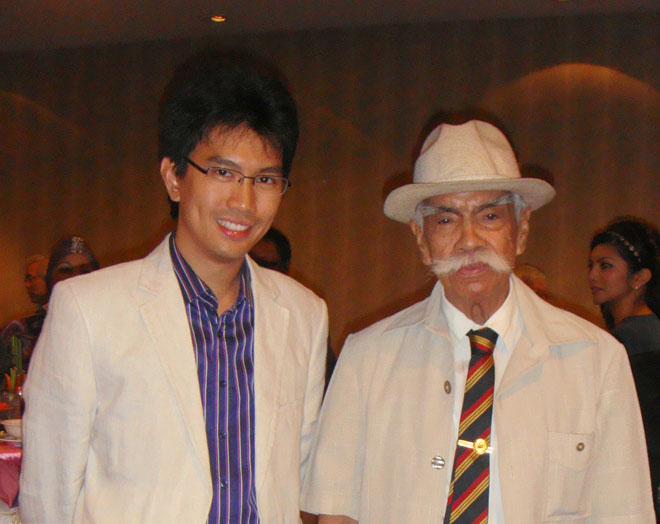
Photo shows the author with Almarhum Tunku Datuk Seri Adnan.
SINCE the passing away of my younger brother Tunku Alif on Jan 15, the extended family has witnessed three more funerals. The first was on Jan 17 for my uncle by marriage Datuk Ridzwan Ariff, who greatly contributed to my younger brother’s special needs programme when he was young. The second was on Jan 23 for Tunku Tolha, a Royal Malay Regiment soldier who served as aide-de-camp to my great-grandfather and grandfather.
The most recent was for my granduncle Tunku Datuk Seri Adnan Tunku Besar Burhanuddin, who passed away on Feb 8 after battling cancer, like two of his children (Tunku A’amash and Tunku Abdiyah) who sadly predeceased him. I have mentioned Tunku Adnan several times in my columns, reflecting the privilege I had of getting to know him better in recent years. Often these would be over conversations at events in Seri Menanti, or at his house in Damansara Heights having been invited to lunch after bumping into him and his grandson at the local mosque on days I didn’t go back to Negeri Sembilan.
He educated me on the circumstances surrounding the death of the seventh Yamtuan Tuanku Muhammad on Aug 1, 1933; how he told the first Agong Tuanku Abdul Rahman that he looked ill three weeks before he passed away on April 1, 1960; and of how his father Tunku Besar Burhanuddin passed away on July 5, 1961 during his third sujud during Asar prayers as Tunku Adnan was driving from Melaka to KL.
During my project on orchestrating the state anthem, he demonstrated how it had evolved over the years, and about his beloved Seri Menanti I learnt so much: the old Istana Baroh originally built on the Ulu Muar river that he and his sister (the first Raja Permaisuri Agong Tunku Kurshiah) relocated to Port Dickson; about certain big cats and hordes of bats; riding elephants to Kuala Pilah; the sense of community that prevailed then; of how, when the Japanese invaded he secretly hid the guns (which they never found); and of how after the Japanese surrender, the Yamtuan held a dialogue with the Malayan People’s Anti-Japanese Army in the Istana as they took control for two weeks before the British Military Administration arrived.
These stories were an amazing insight into the history of the nation, particularly since I never had the opportunity to talk to my grandfathers about these things.
Tunku Adnan’s own early life was typical of a Malay aristocrat born a generation before Merdeka, being sent to the Malay College Kuala Kangsar (like all his seven brothers) where he successfully played a bewildering array of sports. Later in life, he would serve on the committees of several national sports bodies, but his involvement with the Malay College Old Boys Association (whose tie and samping he would usually wear) would last until his death.
His career in the civil service saw him rise to become deputy director-general of Royal Malaysian Customs, which gave him the opportunity to work across the country, sometimes dramatically: within one week he was involved in a boat accident and a helicopter crash “while on a secret mission”. (He also broke bones colliding into a lorry on Bukit Putus en route to Seremban to play hockey for Negeri Sembilan, but all this didn’t dent his enthusiasm for vintage and classic cars.)
There were other hazards of the job too. On one occasion officers from a particular ministry tried to influence him to have some goods released without paying duties. When my granduncle told them that the process had to be followed, the minister called him directly and demanded that he do as told. But Tunku Adnan responded that only a formal cabinet directive or act of Parliament would enable him to carry out the minister’s request.
Such steadfast adherence to his principles in the face of ministerial pressure might have ultimately cost him the top job of director-general, at a time when positions in the civil service were gradually becoming subject to political intervention. He did not mind being sidelined: he was grateful to be able to live his life according to the values he knew were right. But like so many of his generation who were guided by old-fashioned ideas of tradition and duty, it must have been heart-breaking to see the country’s institutions fall prone to patronage and corruption.
He transmitted these values to his children and grandchildren, but as I saw from the tahlil two days after he died, there were so many who loved and were inspired by him. His long life of quiet service with integrity might seem an anachronism, but it is what Malaysians need ever more from their leaders today. Tunku Abidin Muhriz is founding president of Ideas.
